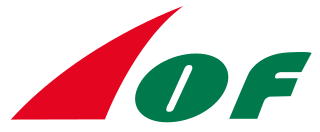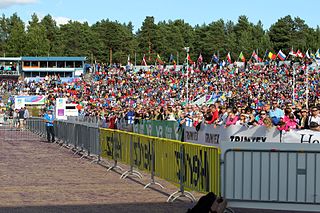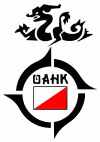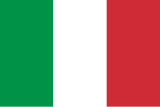
The International Orienteering Federation (IOF) is the international governing body of the sport of orienteering. The IOF head office is located in Karlstad, Sweden. The IOF governs four orienteering disciplines: foot orienteering, mountain bike orienteering, ski orienteering, and trail orienteering.

The World Orienteering Championships is an international orienteering competition which has been organized by the International Orienteering Federation (IOF) since 1966. The World Orienteering Championships is considered to be the most prestigious competition in competitive orienteering. The races are contested between members of the IOF, which are each aligned to a National Olympic Committee.

The Junior World Orienteering Championships (JWOC) are an annual orienteering competition. They were first held in 1990. Entry is open to national teams aged 20 and below as of 31 December in the year of competition. Representative countries must be members of the International Orienteering Federation (IOF).

Matthias Merz is a Swiss orienteering competitor, winner of the 2007 World Orienteering Championships in Kyiv, Ukraine, Long distance, and also earned a silver medal on the Sprint distance in the same championship. He has a bronze medal from the 2005 Relay Championships in Aichi, Japan, as member of the Swiss winning team. When Merz won the bronze medal in the middle distance at the World Championships in Miskolc in 2009, he joined countryman Daniel Hubmann as the only two men to have ever medaled in all four orienteering disciplines at the World Championships.
The Finnish Orienteering Federation is the governing body for the sport of orienteering in Finland. The federation was founded in 1945 and has approximately 60,000 members.
Orienteering Australia is the National organisation responsible for the governing, organisation and promotion of orienteering in Australia. It is a Full Member of the International Orienteering Federation. Orienteering Australia has its own publication The Australian Orienteer.
The Polish Orienteering Association is the Polish national organisation of orienteering. It is a full Member of the International Orienteering Federation.

The French Orienteering Federation (FFCO) is the national orienteering Federation of France. It is a full member of the International Orienteering Federation.

Belgian Orienteering Federation ABSO-BVOS is the national Orienteering Association in Belgium. It is recognized as the orienteering association for Belgium by the International Orienteering Federation, of which it is a member.
The Český svaz orientačních sportů (ČSOS) is the national Orienteering Association in Czech Republic. It is recognized as the orienteering association for the Czech Republic by the International Orienteering Federation, of which it is a member.

Orienteering Association of Hong Kong (OAHK) is the HSK organisation responsible for orienteering in Hong Kong. It is a Full Member of the International Orienteering Federation.
The Danish Orienteering Federation is the national Orienteering Association in Denmark. It is recognized as the orienteering association for Denmark by the International Orienteering Federation, of which it is a member.
The Norwegian Orienteering Federation is the national Orienteering Association in Norway. It is recognized as the orienteering association for Norway by the International Orienteering Federation, of which it is a member. The association was founded 1 October 1945, and is a member of the Norwegian Confederation of Sports (NIF). Its first chairman was Kaare Thuesen. In 1946 NOF had 204 associated clubs, with just above 7,000 members. The number of clubs and associated members increased gradually through the 1950s, 1960s and 1970s, and peaked in 1984 with 630 clubs and 34,000 members, and 35,000 members and 620 clubs in 1985. The next twenty years saw a decline in the number of clubs and members. As per December 2007 Norges Orienteringsforbund had 400 associated clubs and just above 24,000 members, distributed over eighteen districts.
Deutscher Turner Bund, Abteilung Sport Orientierungslauf is the national Orienteering Association in Germany. It is recognized as the orienteering association for Germany by the International Orienteering Federation, of which it is a member.

Foot orienteering is the oldest formal orienteering sport, and the one with the most "starts" per year. Usually, a FootO is a timed race in which participants start at staggered intervals, are individually timed, and are expected to perform all navigation on their own. The control points are shown on the orienteering map and must be visited in the specified order. Standings are determined first by successful completion of the course, then by shortest time on course.
The Hungarian Orienteering Federation is the governing body for orienteering in Hungary. It is recognized as Hungary's national orienteering association by the International Orienteering Federation (IOF), of which it is a member.
Swiss Orienteering is the national Orienteering Association in Switzerland. It is recognized as the orienteering association for Switzerland by the International Orienteering Federation, of which it is a member.
New Zealand Orienteering Federation is the national Orienteering Association in New Zealand. It is recognized as the orienteering association for New Zealand by the International Orienteering Federation, of which it is a member.

South African Orienteering Federation (SAOF) is the national Orienteering Association in South Africa. SAOF was founded in 1981, and is recognized as the orienteering association for South Africa by the International Orienteering Federation, of which it is a member.
The World Mountain Bike Orienteering Championships is the official event for awarding World Champion titles in mountain bike orienteering. The World Championships, also known as WMTBOC, were first held in 2002, and since 2004 they have been organized annually – except in 2020. The programme includes Long distance, Middle distance, Sprint, Mass Start, and a Relay for both men and women.










